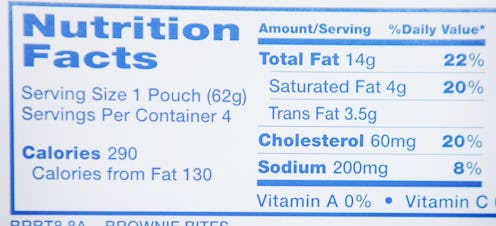News
Why Are Trans Fats Bad For You?
President Obama's campaign against trans fats become a booming success Tuesday when the Food and Drug Administration announced its trans fat decision, which has been expected for months. The FDA has given the food industry until June 18, 2018 to phase out trans fats products. The FDA's full statement, released Tuesday, cites numerous reasons why the agency has gotten behind Obama's plan to oust trans fats. Its main goal is to prevent cardiovascular disease, and the food industry has already managed to cut trans fat by 85 percent, according to Politico.
The FDA said in its statement:
Based on the available scientific evidence and the findings of expert scientific panels, the Food and Drug Administration (FDA or we) has made a final determination that there is no longer a consensus among qualified experts that partially hydrogenated oils (PHOs), which are the primary dietary source of industrially-produced trans fatty acids (IP-TFA) are generally recognized as safe (GRAS) for any use in human food.
Normally, "trans fat free" seems like just a reason not to feel guilty about ordering five boxes of Girl Scout cookies. Seriously, though — what does that really mean, and why are trans fats so unhealthy?
Most trans fats are fats that are formed through an industrial process that adds hydrogen to vegetable oil to make them more solid, according to the Mayo Clinic. Sometimes, a small amount of trans fat can be formed in certain meat and dairy products.
You can usually tell whether your food contains trans fats by looking at the ingredient list for "partially hydrogenated oils," or "trans fats" according to the American Heart Association. However, under current U.S. law, food labels can say that an item has 0 grams of trans fat if it has less than 0.5 grams of trans fat.
The food industry uses PHOs because it's less likely to spoil than other oils, giving the food a longer shelf life. Restaurants can use PHOs in their fryers because they don't have to be changed as often. PHOs are most likely to be found in baked goods that contain shortening, snacks like some chips and popcorns, fried foods, refrigerated dough, coffee creamer, and margarine.
Many doctors consider trans fat the absolute worst kind of fat. PHOs raise the bad kind of cholesterol, the LDL cholesterol, and lowers the good kind, the HDL, according to the Mayo Clinic. This process has been heavily cited as a cause of heart disease, which is the cause of 25 percent of all American deaths, according to the Centers for Disease Control. It's the leading cause of death in both men and women. Trans fats are also associated with higher risk for stroke and type 2 diabetes, according to the AHA.
To avoid trans fats, in short, you might want to avoid commercially fried foods and baked goods. And for good heart health, you can incorporate a ton of fruits, vegetables, whole grains, low-fat dairy, lean meats, and nuts into your diet, according to the AHA. When cooking, use natural oils, and avoid foods that have PHOs on the ingredient list. Luckily, in three years, you won't have to worry too much about it anymore!
Images: Getty Images (2)
